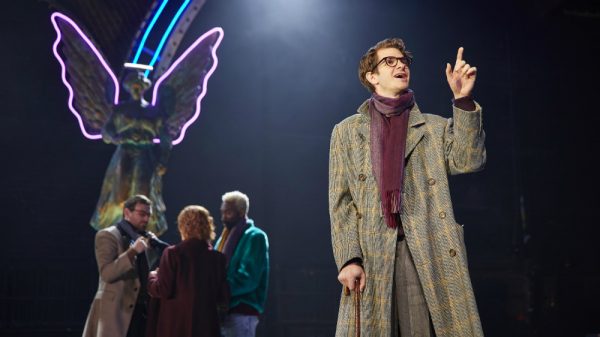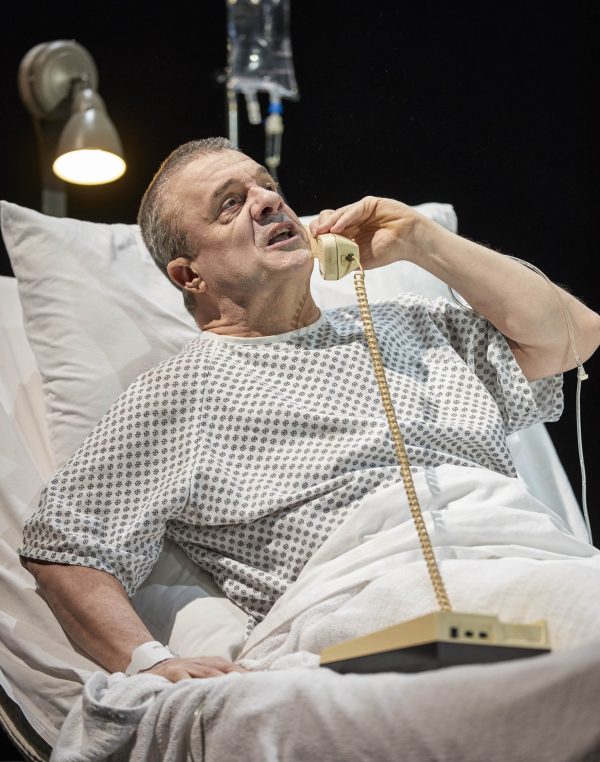It’s been over 20 years since Angels in America, Tony Kushner’s epic two-part dramatic response to the AIDS crisis, burst onto the world stage. In spite of its age and the fact that it takes place ten years earlier (1985-6), this epic remains startlingly relevant and Marianne Elliott’s highly theatrical and insightful new production, now on Broadway after a smash run at the National Theater in London, is simultaneously massive and intimate. When the play opened (Part One—Millennium Approaches premiered in San Francisco in 1991, Part Two—Perestroika debuted on Broadway in 1994), critics predicted it would take its place alongside the masterworks of O’Neill, Williams, and Miller. This quirky, heartfelt revival confirms that status.

Credit: Brinkhoff & Mogenburg
Kushner’s saga chronicles the struggles of a diverse group of characters—including displaced Mormons, urban gay men, disturbed spirits, and actual historic figures—as they cope with a devastating disease, heavenly visitations, and political, religious, and sexual hypocrisy and oppression. The author’s complex and pointed observations on America’s schizophrenic attitudes towards its citizens can be applied just as readily to 2018. Though we have same-sex marriage, theoretical LGBT rights and gender equality, powerful forces are still poised to roll the clock back. “The world only spins forward,” proclaims Prior Walter (a vibrant, wonderfully bitchy Andrew Garfield), the reluctant gay prophet, in the final scenes of the play. He is railing against panicked angels abandoned by God and desperate for humans not to progress. The same conflict between forward motion and stasis still exists and Angels still addresses it.
As in her Tony-winning productions of War Horse and The Curious Incident of the Dog in the Night-Time, Elliott employs frankly theatrical elements such as puppetry and visible, Noh-like stagehands to underline the gradual stripping of the characters’ defenses. In the first part, Millennium Approaches, Ian MacNeil’s intricate set is full of revolving stages and showy effects. Paule Constable’s lighting creates eerie nightmares and dewey dreamscapes. But in the second part, Perestroika, artifices are removed and we are left with a mostly bare stage. The heavenly angels and the gods of the theater cannot save humankind. As Pryor proclaims, we’ll have to do it ourselves.

Credit: Brinkoff & Mogenburg
This balance of realism and showmanship is spectacularly exemplified by the performance of Nathan Lane as Roy Cohn, the real-life power lawyer who advances a right-wing agenda wile living a closeted gay life. Cohn is the deliciously evil villain of the play whose politics of greed and narcissism are a feast of malice for any actor to chow down on. But Lane also captures Cohn’s charm and his confused paternal connection with Joe Pitt, the repressed gay Mormon (a brilliantly conflicted Lee Pace). (These elements were played down or missed by Ron Leibman who played Cohn in the original Broadway production, Frank Wood in the Signature Theater revival Off-Broadway and Al Pacino in the HBO mini-series.) Lane is at once is the hissable creep delivering Kushner’s screamingly funny put-downs and the twisted human being reaching out for solace as he is struck down by AIDS.
Another fascinating mix of verisimilitude and high art is provided by the depiction of the Angel who visits Pryor, played with daring sexual ambiguity by Amanda Lawrence. In the original New York production, she looked as if she had stepped out of a Rennaissance painting. Here costume designer Nicky Gillibrand has placed her in a rag-tag frock with a ruined American flag for a skirt and grey droopy wings. Rather than flying on Peter Pan wires, she is carried and manipulated by several black-clad “shadows.” She is a symbol of the sad state of the world and a breathing figure seeking a way to heal that broken planet.
In addition to those already mentioned in the stellar company, Susan Brown captures the motherly strength of Pitt’s mother and the ghost of Ethel Rosenberg, Denise Gough gives eloquent voice to the inner panic of Joe’s pill-addicted wife Harper, James McArdle finds the shattered core of Louis, Pryor’s unfaithful boyfriend, and Nathan Stewart-Jarrett is sizzlingly witty and razor sharp as Belize, Cohn’s sassy nurse and Pryor’s supportive friend.
It should come as no shock that Roy Cohn was a mentor to the young Donald Trump and Angels still blazingly depicts the American cultural civil war that our current President is waging. It is possible to see both parts in one glorious marathon day as this reviewer did. The whole seven and a half hour experience moves like a jet-propelled dream. It’s an experience you’ll never forget.
March 25—July 1. Neil Simon Theatre, 250 W. 52nd St., NYC. Schedule varies. Running time: Part One: Millennium Approaches: three hours and 30 mins. including two intermissions; Part Two: Perestroika: four hours including two intermissions. $49—$169. (877) 761-2770. www.ticketmaster.com.
This review previously appeared on ArtsinNY.com and Theaterlife.com.
[alert type=alert-white ]Please consider making a tax-deductible donation now so we can keep publishing strong creative voices.[/alert]
